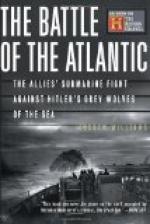Where I leaned alone against the rail, my eyes followed the Spaniard in doubt and questioning, nor could I entirely banish from mind Haley’s description of that buccaneer, bearing a similar name, under whom he had been compelled to serve through scenes of crime. Yet, in spite of my unconscious desire to connect these two together, I found it simply impossible to associate this rather soft-spoken, effeminate dandy with that bloody villain, many of whose deeds were so familiar to me. The distinction was too apparent. Beyond all doubt this fellow concealed beneath his smiles a nature entirely different from the one he now so carefully exhibited. He could hate fiercely, and nourish revenge, and he was capable of mean, cowardly cruelty. His threat toward me, as well as that strange incident Fairfax had observed on the deck of the Romping Betsy, evidenced all this clearly, yet such things rather proved the man a revengeful coward instead of a desperate adventurer. Black Sanchez, according to all accounts, was a devil incarnate, and no such popinjay as this maker of love, could ever be changed into a terror of the sea. He was not of that stern stuff. That it was perfectly easy for him to lie—even natural—was no surprise to me. This seemed to accord with his other characteristics; nor was it altogether strange that he should be fairly familiar with these waters. If, as he claimed, he had once been connected with the Spanish navy, which quite likely was true, even if he had never visited this coast in person, he might have had access to their charts and maps. It was well known that early Spanish navigators had explored every inch of this coast line, and that their tracings, hastily as they had been made, were the most correct in existence. His memory of these might yet retain sufficient details through which he could pretend to a knowledge much greater than he really possessed.




